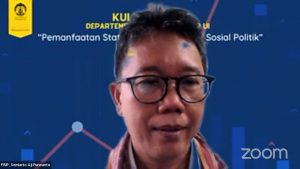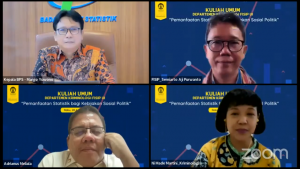“The application of statistics towards social and political policies, policies oriented towards the handling of social and political issues, is no longer based on mere ideas and intuition of decision makers and implementers. Instead, the application of statistics must be supported by a framework based on scientific theory and, certainly, based on data.” On Friday (25/4), the Head of the Department of Criminology, Faculty of Social and Political Sciences Universitas Indonesia (FISIP UI), Dr. Ni Made Martini Puteri, M.Si., delivered a public lectured headlined “Statistics Applied to Social and Political Policies”.
Data that can be relied upon are those that are obtained through accountable, ethical, analytical, and comprehensive processes and procedures of data collection, according to Dr. Made Martini. “In the context of public policies possessing socio-political policy dimensions, valid data is an absolute requirement to a certain policy. Theories in socio-political sciences will carry more weight when supported by solid statistics, and vice versa; statistical data will be meaningful and contribute to predictions of the future when analysed with the proper theories.”

According to Dr. Made Martini, the Department of Criminology has actively supported the Directorate of Social Resilience Stastistics, Statistics Indonesia (BPS) in launching the Indonesia Criminal Statistics Database (SDSKI), a concrete example of how statistics can be used in facing problems and challenges in society, in this case crime.
Dr. Made Martini expressed her optimistic view of SDSKI’s future prospects. “We hope SDSKI may soon come into fruition, so that stakeholders of crime prevention in Indonesia can respond to crime in a strategic and data-supported manner. SDSKI may, in addition, be used as a reference by UI students and researchers, as a valid source of data for socio-political research to be performed.”
SDSKI is designed to record, on a time and place basis, comprehensive statistics of criminals and information on perpetrators and victims of crime. SDSKI may thus be considered a macro data repository which may be used to analyse trends in crime on a certain period of time and specific region. Academicians specialising in criminology will directly benefit from SDSKI, as the database would facilitate research on issues in crime. Publications and research output shall likewise be bolstered by a secondary source of data.

The Dean of the Faculty of Social and Political Sciences, Prof. Dr. Semiarto Aji Purwanto, appreciates the initiative that the Department has taken in its collaboration with Statistics Indonesia. “This [act of] collaboration is a strategic partnership. As a scientific and educational establishment, FISIP UI really needs statistical data and has the capability of making use of it.”
Prof. Aji revealed that the Department of Criminology has collaborated with the Directorate of Social Resilience Statistics in the preparation of an integrated criminal statistical data since 2021. “Universities have vital roles and responsibilities to perform in policymaking processes. However, currently a very great distance exists between policymaking and political processes [on one hand], and scientific developments in unversities. Universities should therefore keep carrying out evaluations to determine the extent of the impact of academic activities towards on the quality of public policies. Policies oriented towards social and political issues shoul not be solely based on valid scientific theories, but should also be supported by reliable statistics.”

Meanwhile, the Head of Statistics Indonesia, Dr. Margo Yuwono, stated, “SDSKI is an implementation of Satu Data Indonesia,” referring to the database managed by the Ministry of National Development Planning (Bappenas). “SDSKI is an answer to the need for comprehensive and continuous criminal statistical data. Speaking of SDSKI [will imply] two issues, namely criminal statistical data management needed to regulate the maintenance of data generated by central and local agencies, and a comprehensive scope to make sure the scope of criminal statistical data is in line with the International Classification of Crime for Statistical Purpose (ICCS).”
Margo claims that presently, criminal statistical data in Indonesia has yet to satisfy national and international needs. Available data “still needs to be developed so as to satisfy global indicators.” Another issue he sees in the state of criminal statistics in Indonesia is how “data collected by [differing] producers of criminal statistics data is not interconnected, and may potentially clash with each other. Differences in data standards and reference codes may cause problems in data consistency. These may happen because Indonesia has yet to adopt the international standard classification for criminal statistics, namely the International Classification of Crime for Statistical Purpose (ICCS) and United Nations Statistical Commission (UNSC), so that differing concepts and disaggregations [are employed].
“Academicians and universities have roles to play in the development of SDSKI. First, as an advisory group to aid in the identification and discussion of criminal statistical data needs, provide technical assistance (literature and theoretical frameworks) related to criminal statistics. Secondly, as users of SDSKI as an object of analysis and interpretation. And finally, [to perform] scientific research and become a part of a criminal statistical data forum serving as controllers in the development of SDSKI.”




